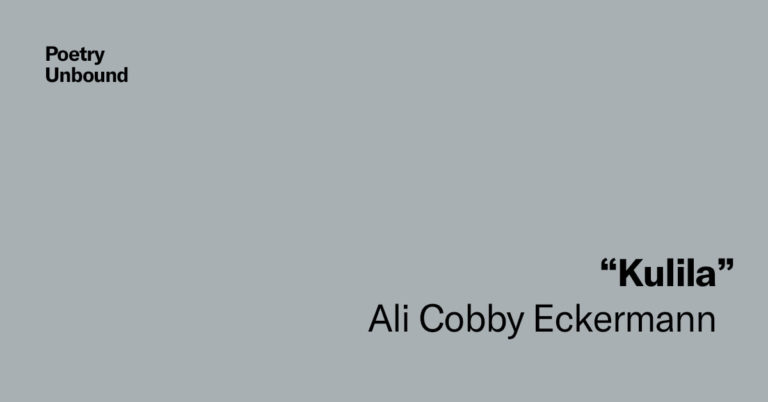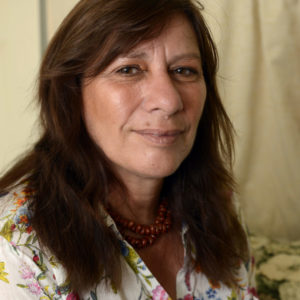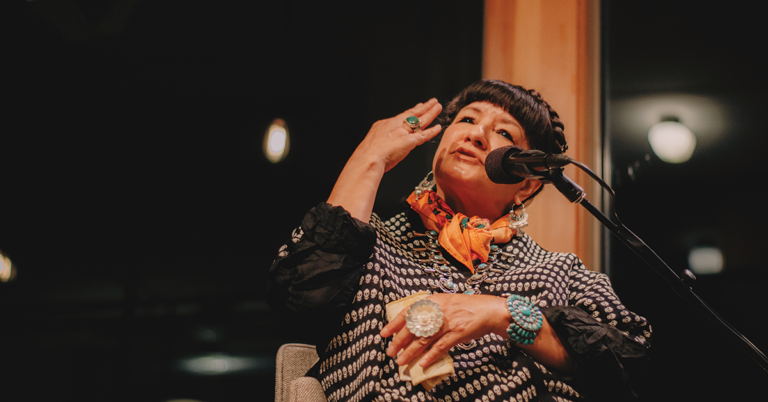Ali Cobby Eckermann
Kulila
Ali Cobby Eckermann’s poem “Kulila” insists on remembering as a moral act. Through the poem, the Aboriginal poet mourns the loss of Indigenous cultures in Australia and how they have been damaged and changed by colonization. Cobby Eckermann calls her readers to a place of listening and lament as a way to keep alive the memory of who we are and who we could’ve been.
A question to reflect on after you listen: What in your culture or community needs to be lamented, honored, and told?

© All Rights Reserved.
Guest

Ali Cobby Eckermann is a Yankunytjatjara Aboriginal poet and the author of seven books, including Ruby Moonlight, the poetry collections Inside My Mother, and a memoir, Too Afraid to Cry. She is the recipient of the Windham-Campbell Prize in Poetry from Yale University.
Transcript
Pádraig Ó Tuama, host: My name is Pádraig Ó Tuama, and I am from Ireland, and I am a poet. Poetry and pilgrimage are often put together, and I think there’s a deep wisdom behind analyzing these words, especially the word “pilgrimage.” Pilgrimage is never about reaching the place that you’re going on pilgrimage to. The pilgrimage happens when you begin; the desire to go. And poetry, too, is rarely about the control of exactly where we’ll go. Poetry is about what will unfold that’s unexpected in the desire, right here, right now.
[music: “Every Place We’ve Been” by Gautam Srikishan]
Ali Cobby Eckermann is an Australian poet of indigenous Australian ancestry. She’s a Yankunytjatjara woman born in Kaurna land in south Australia. Her poem is “Kulila.”
“Sit down sorry camp
Might be one week
Might be long long time
Tell every little story
When the people was alive
Tell every little story more
Don’t forget them story
Night time tell ’em to the kids
Keep every story live
Don’t change the story
Tell ’em straight out story
Only one way story
All around them story
Every place we been
Every place killing place
Sit down here real quiet way
You can hear ’em crying
All them massacre mobs
Sit down here real quiet
You can feel them dying
All them massacre mobs
Hearts can’t make it up
When you feel the story
You know it true
Tell every little story
When the people was alive
Tell every little story more
Might be one week now
Might be long long time
Sit down sorry camp”
So I’ve been familiar with Ali Cobby Eckermann for a while. She is a well-renowned poet in Australia, and her work documents much of the way in which adoption, forced adoption, trickster adoption, was used as a eugenics project to steal children from their parents, give those children to European families to be brought up, often with a story to say, oh, that the European family are being very benevolent to this child; perhaps this child was an orphan, or — some absolutely invented lie was given to European families, sometimes. Sometimes the European families knew what they were doing, in terms of actively participating in a eugenics project to remove children. So, as a poet, her voice has been quite prominent in putting narratives forward about how to respond to the reality of the Stolen Generations, which was a feature of the 20th century, enormously, in the Australian landscape. And in Ali Cobby Eckermann’s family, there are four successive generations where adoption was used — sometimes deliberately, sometimes by tricksterism — all kinds of ways within which these things were happening. And this impoverishes generations and communities. And then, that impoverishment is used as a further justification for future forced adoptions, then.
So for me, the two words that are really important, in this extraordinary poem, “Kulila” — and “kulila” has the resonance of the word “listen.” It’s a call to listen to an old story. The two words that are really important are “sorry” and “story.” And “story” is repeated over and over, throughout this, and I think the call is to engage in the sorry business of telling the story. And telling the story isn’t just telling it once: “OK, we told the story; it’s recorded now. Done. Let’s move on. Let’s be reconciled.” This is saying, no, the story has to live, and you have to keep on telling the story. And even if it makes your children cry, for them to be initiated into this as a story of terror, you have to tell it and to keep on finding a way to repeat that, over and over, because there are things that can never be restored. And Ali Cobby Eckermann is saying, we need to tell that story, regularly, in a present participle; in the ongoing way, to keep on telling that story.
And the idea that you can move on from the annihilation of people is absolutely the privilege of the inheritors of the colonies. [laughs] Nobody can say that when their language and their people have been annihilated — “Oh, yeah, we’ve moved on now, because we had a recognition in 2008 that something terrible happened.” This has to be part of moving on, is part of telling the continual story of sorry.
So “hearts can’t make it up / when you feel the story / you know it’s true,” for me, is a really powerful challenge to the idea that some people might say, Oh, because the total statistics about who was displaced from where, those numbers weren’t recorded. Therefore, when Indigenous people are asserting the story, people would say, “Yeah, but where’s the evidence?” using really western measures of so-called truth-telling to dismember the truth of a story of displacement. And so, because you don’t fit our story as to what’s true, therefore we don’t believe your story about what’s true. And so, I see “hearts can’t make it up” as an extraordinary protest against this idea of having quantitative details about who and when and where and why and how. When a people are being taken from themselves, they don’t sit down and write the statistics. So to speak about hearts is an intervention into this to say, what heart could make this up? Why should anybody make this up in their heart? You can’t make this up in your heart. This is true.
Ali Cobby Eckermann’s poem calls readers to pay attention to the fact that remembering is a moral act; it is a courageous act, and to remember the ways in which our people may have participated in massacre mobs and to remember that mourning is an ongoing muscle that we need to recognize and that we need to practice; that the things that have been taken away from our peoples, when we’re part of a people who have suffered — those things need to be remembered in a way that might even cause a bit of pain. But we need to do it, to keep alive the memory of who we are and who we could’ve been.
“Kulila” by Ali Cobby Eckermann.
“Sit down sorry camp
Might be one week
Might be long long time
Tell every little story
When the people was alive
Tell every little story more
Don’t forget them story
Night time tell ’em to the kids
Keep every story live
Don’t change the story
Tell ’em straight out story
Only one way story
All around them story
Every place we been
Every place killing place
Sit down here real quiet way
You can hear ’em crying
All them massacre mobs
Sit down here real quiet
You can feel them dying
All them massacre mobs
Hearts can’t make it up
When you feel the story
You know it true
Tell every little story
When the people was alive
Tell every little story more
Might be one week now
Might be long long time
Sit down sorry camp”
Lily Percy: “Kulila” comes from Ali Cobby Eckermann’s book Inside My Mother. Thank you to Giramondo Publishing, who published the book and gave us permission to use Ali’s poem. Read it on our website at onbeing.org.
Poetry Unbound is Tony Liu, Chris Heagle, Kristin Lin, Erin Colasacco, Serri Graslie, Eddie Gonzalez, and me, Lily Percy. Our music is composed and provided by Gautam Srikishan. This podcast is produced by On Being Studios, which is located on Dakota land. We also produce other podcasts you might enjoy, like On Being with Krista Tippett, Becoming Wise, and This Movie Changed Me. Find those wherever you like to listen, or visit us at onbeing.org to find out more.







Reflections